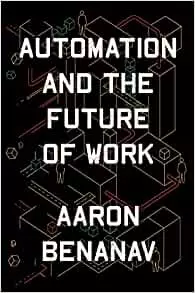Automation and the Future of Work
Aaron Benanav
"Automation and the Future of Work", Aaron Benanav
Basic income is preferable to Marxist nirvana
The two divergent classical responses to the evident defects of capitalism are i) Keynes’s view that capitalism can be fixed, and ii) Marx’s view that it can’t and will either self-destruct or be destroyed. Aaron Benanav takes the second, and it is his Marxist agenda, rather than any persuasive logic, which drives his rejection of basic income’s claim as a ‘sticking plaster’ to correct the dysfunctionalities of current capitalist economies. Keynes was arguably right in arguing that deficit-funded government infrastructure investment and welfare expenditure, coupled with higher wages to fund demand, rather than the neo-classical proposal for lower wages to price labour back into work, would prove to be effective remedies for involuntary unemployment.
So can UBI funded by debt-free sovereign money correct any of the current economic dysfunctionality of recurrent crisis, pervasive debt, austerity, low pay, in-work poverty, massive inequality, and ecological damage?
Benanav thinks not. He is scathing and derisory of the ‘automation theorists’ claim that technology is destroying jobs, referring to a ‘jeans-wearing elite’ (p3) promoting ‘technocratic fantasies’ (p11) who want to ‘wind down the economy’ (p72). His alternative explanation that global overcapacity has driven down demand for labour (p26) sits inconsistently with his claim that capital has gone on strike and refused to invest (p70). He is right to point out that the productivity paradox can arise as societies seek to load production with social costs, for example by delaying retirement age, but wrong in his claim that productivity does not affect the service sector when empirical examples from banking, insurance, and law show the opposite.
His rejection of Charles Murray’s right-wing case for UBI would be shared by most UBI advocates, but he fails to do justice to left-wing calls for UBI from advocates like Philippe van Parijs and others he fails to mention, all of whose work cannot be dismissed in the half-page Benanav allocates (p75). Contrary to Benanav’s claim, research at the Institute for Policy Research at the University of Bath, UK, does show technology to be a major cause of reduced labour share. Benanav cannot dispute clear empirical evidence that labour income has consistently fallen against consumer expenditure for the whole post-war period, necessitating an increase in ‘unearned income’ from pensions, welfare benefits, dividends, and household debt. It’s clear that in a totally automated economy, all income would be UBI, all funded by debt-free sovereign money, and therefore reasonable to propose that in partially automated economies, this is proportionately true.
The extremity and clarity of his Marxist agenda are set out in proposals to ‘threaten firms with full socialisation’, ‘doing away with private enterprise’, ie ‘a truly existential threat to asset owners’ wealth’ in order to ‘bring capital to heel’ giving ‘power to democratic organs of the people themselves’ (p71). He advocates ‘progressive socialisation of the means of production via a planned transfer of asset ownership to society at large’, with ‘a conquest of production which finally succeeds in wresting the power to control investment decisions away from capitalists’ (p79). We’ve been there before. I personally spent over 15 years in nearly 50 cities of post-Soviet Russia, seeing first hand the dismal results.
His closing advocacy of a socialist nirvana where ‘everyone can go to social warehouses and service centres to get what they need, hop on a train, get their teeth cleaned’ (p88), all made possible through an abundance derived not from technology, but from ‘social relationship’ (p89), and threateningly coordinated by ‘various committees’ (p92), is nowhere explicated. It relies on some combination of human selflessness and purity and ignores the prevalence of human moral failing. His main complaint about basic income proposals is that they don’t adopt his Marxist paradigm, and even dare to offer a more reasoned alternative to it.
Technology has delivered huge increases in standards of living, but it has also sucked income out of the economy, which in turn has led to huge increases in household debt, and in government debt from accumulated deficits to meet social welfare needs. The urgent issues are to get income to people and to get debt out of the economy. Only basic income funded by debt-free sovereign money offers to achieve this. Capitalism has and can morph into more socially responsible definitions. Its overthrow of a Marxist paradigm carries the huge empirically realised threat of tyranny and dictatorship.
The book is available here.
Geoff Crocker
Editor ‘The Case for Universal Basic Income'
www.ubi.org

